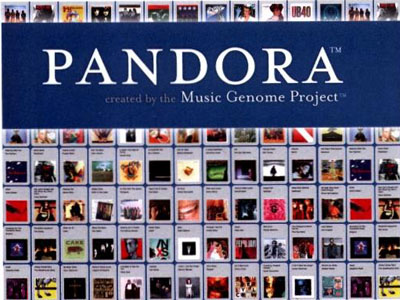ASCAP Trying to Block Pandora's Radio Station Acquisition
Pandora's acquisition is a royalty bargaining chip and won't benefit the locals, claims ASCAP.

Back in June, Christopher Harrison, Pandora’s assistant general counsel, revealed that the company actually purchased a radio station located in Rapid City, South Dakota: KXMZ, Hits 102.7. Why? Harrison provided a long explanation in a blog on The Hill, and basically said that ASCAP is charging online radio companies like Pandora far more in royalty fees than those re-broadcasting land-based radio stations.
"This acquisition allows us to qualify for the same Radio Music License Committee (RMLC) license under the same terms as our competitors," he said. "While this might seem like an unexpected move for Pandora, it makes sense even beyond the licensing parity."
Since its acquisition, Pandora has been running the terrestrial radio station under a local programming and marketing agreement with the FCC (pdf). Nothing seems to be out of the ordinary: the radio station will offer programming 24 hours a day, seven days a week, and offer a two-hour window on Sunday morning for special programming like local government interviews. Business as usual.
However ASCAP, or rather the American Society of Composers, Authors and Publishers, has filed a complaint with the FCC to block Pandora from running its terrestrial station. Pandora reportedly failed to disclose its full ownership and demonstrate that it meets the agency's rules about foreign ownership of radio stations, an FCC requirement.
"Moreover, Pandora's acquisition of KXMZ would not serve the public interest," the complaint states. "Pandora's public statements lay bare its plot: to use KXMZ as a bargaining chip in Pandora's quest to obtain lower royalty rates for its online music streams."
In Harrison's post, he talks about discrimination against Pandora and how competitors like iHeartRadio have different royalty rates. What he doesn't fully clarify is that iHeartRadio is completely different, pulling terrestrial broadcasting from around the world onto the Internet – stations that already pay royalty fees. Pandora doesn't re-broadcast, but instead allows users to create their own "stations", thus its royalty fees are understandably higher.
Harrison also noted that ASCAP failed to provide required transparency in identifying songs ASCAP claims it can license to Pandora. ASCAP also supposedly created a scheme by which "member-publishers can withdraw their catalogs from ASCAP's license for Pandora but allow them to remain for everyone else, including competitors like iHeartRadio."
Sign up to get the BEST of Tom's Guide direct to your inbox.
Get instant access to breaking news, the hottest reviews, great deals and helpful tips.
Thus by acquiring a terrestrial radio station, Pandora believes it should pay the same royalty rates as iHeartRadio and other competitors. The company isn't hiding that fact, and ASCAP responded by calling Pandora's application "defective".
"Residents of KXMZ's service area will be left to suffer the consequences of a licensee who has no desire or intention to serve their local needs," ASCAP stated.
In addition to the complaint, ASCAP updated its website with several facts regarding Pandora and how much it actually makes from songwriters – Pandora isn't the "victim" as it portrays itself to be. These facts include a reported $126 million in first quarter revenue in May 2013, every 1,000 plays of a song is only worth 8 cents, and so on.
"We are reviewing the filing and will respond per the standard procedure," Pandora said in response to ASCAP's complaint with the FCC. "We have confidence in the process and strongly believe in our legal position. Our purchase of KXMZ will better serve the community by offering a broader selection of music and artists customized to local tastes. We look forward to providing an enhanced listening experience to the community."
Kevin started taking PCs apart in the 90s when Quake was on the way and his PC lacked the required components. Since then, he’s loved all things PC-related and cool gadgets ranging from the New Nintendo 3DS to Android tablets. He is currently a contributor at Digital Trends, writing about everything from computers to how-to content on Windows and Macs to reviews of the latest laptops from HP, Dell, Lenovo, and more.
-
abbadon_34 My only question: If Pandora wins, does that mean free/cheaper subscriptions to its users?Reply -
NotYetRated It annoys me to no end when people speak of revenues. Net profit is the number that makes sense to be argued, not revenue.Reply -
ddpruitt I like how Pandora argues that it pays more in royalties than anyone else. Last time I checked Pandora pays around 1/10 per play as most other broadcasters. I like Pandora but this is the pot calling the kettle black.Reply
